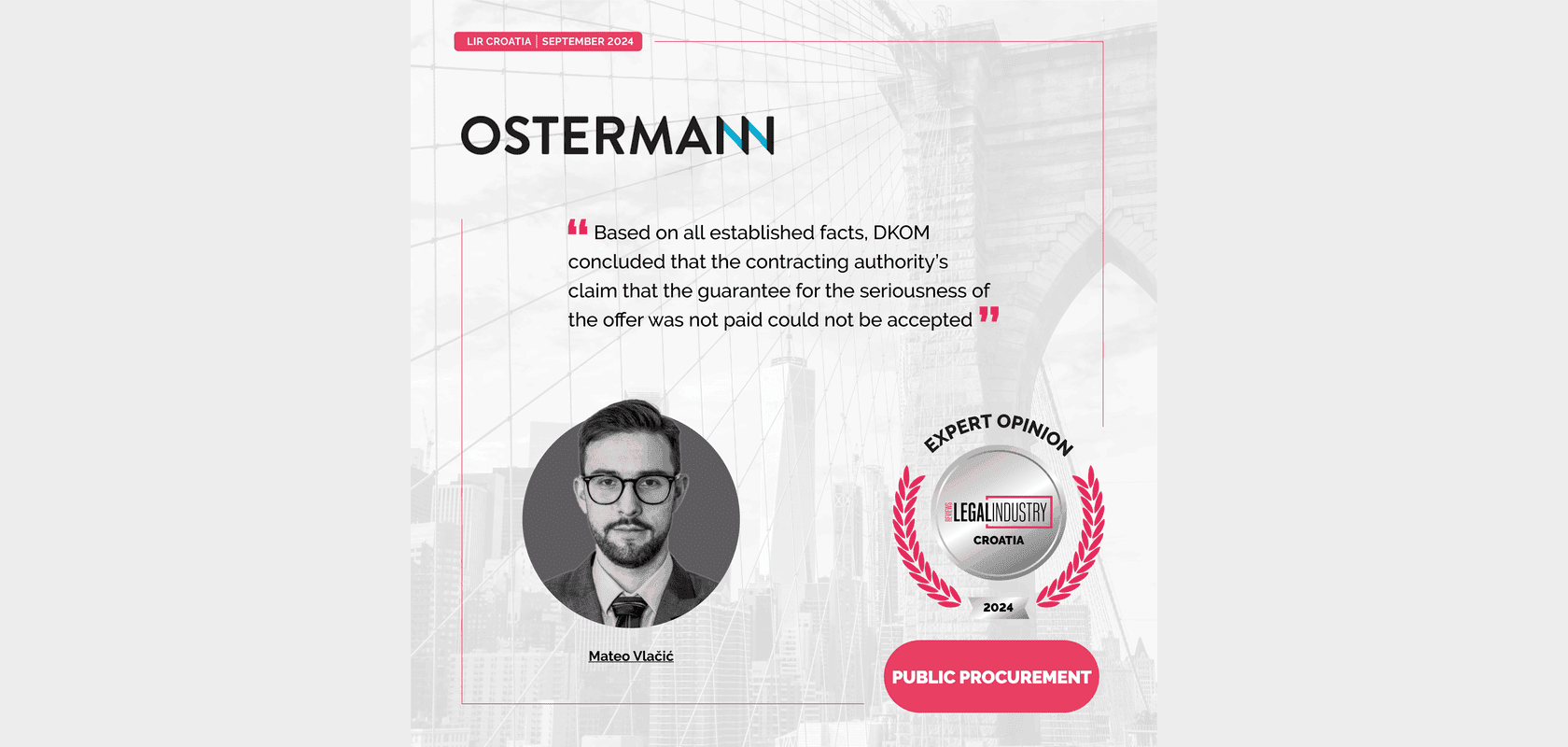Cash Deposit as Bid Guarantee: Can a Non-Bidder Make the Payment?
Insights
The Public Procurement Act allows contracting authorities to request a guarantee for the seriousness of the offer in public procurement procedures as a security instrument against certain risks. In connection with this, the contracting authority must clearly specify the type, method, and conditions of the guarantee, but according to the law, it cannot require a cash deposit. Nevertheless, the bidder always has the option to provide a cash deposit in the required amount instead of the requested guarantee, such as a bank guarantee or promissory note.
The guarantee for the seriousness of the offer is determined in an absolute amount that must not exceed 3% of the estimated value of the procurement. During the review and evaluation of offers, the contracting authority first checks whether the guarantee for the seriousness of the offer was delivered before the deadline for submitting offers and must reject the offer as irregular if it was not delivered on time. However, if proof of payment of the cash deposit is provided, it is considered a valid guarantee for the seriousness of the offer, in accordance with Article 214 of the Public Procurement Act.
In this regard, regardless of the type of guarantee specified by the contracting authority, the bidder can always offer a cash deposit as a guarantee in the required amount. This flexibility allows bidders to choose the most convenient way to secure their offers, whether it is a cash deposit or prescribed form of guarantee. In practice, therefore, cash deposits as a guarantee for the seriousness of the offer are increasingly common, and the State Commission for the Supervision of Public Procurement Procedures (DKOM) has confirmed in its decision that it is even possible for someone else to pay the cash deposit on behalf of the bidder.
Specifically, a situation was considered where a third party made the payment for the bidder, while the contracting authority claimed that the guarantee for the seriousness of the offer was not delivered because there was no record of the payment by the bidder. During the procedure, it was determined that the company from Zagreb paid the cash deposit on behalf of the bidder and noted in the payment description that it was a cash deposit paid for the bidder and in his name, to avoid potential delays due to international transactions and to speed up the payment process itself.
The contracting authority recorded the mentioned payment in the review and evaluation report but considered it invalid because the payment was not made by the bidder himself. DKOM, however, concluded that, since the procurement documentation does not prohibit the payment of the deposit by a third party and since it was clear from the payment description that it referred to the bidder, the guarantee for the seriousness of the offer was validly delivered.
Based on all established facts, DKOM concluded that the contracting authority's claim that the guarantee for the seriousness of the offer was not paid could not be accepted. Therefore, even though the deposit was made by a different economic entity, it still satisfied all the conditions outlined in the procurement documentation, and the deposit was recognized as valid and acceptable.
The guarantee for the seriousness of the offer is determined in an absolute amount that must not exceed 3% of the estimated value of the procurement. During the review and evaluation of offers, the contracting authority first checks whether the guarantee for the seriousness of the offer was delivered before the deadline for submitting offers and must reject the offer as irregular if it was not delivered on time. However, if proof of payment of the cash deposit is provided, it is considered a valid guarantee for the seriousness of the offer, in accordance with Article 214 of the Public Procurement Act.
In this regard, regardless of the type of guarantee specified by the contracting authority, the bidder can always offer a cash deposit as a guarantee in the required amount. This flexibility allows bidders to choose the most convenient way to secure their offers, whether it is a cash deposit or prescribed form of guarantee. In practice, therefore, cash deposits as a guarantee for the seriousness of the offer are increasingly common, and the State Commission for the Supervision of Public Procurement Procedures (DKOM) has confirmed in its decision that it is even possible for someone else to pay the cash deposit on behalf of the bidder.
Specifically, a situation was considered where a third party made the payment for the bidder, while the contracting authority claimed that the guarantee for the seriousness of the offer was not delivered because there was no record of the payment by the bidder. During the procedure, it was determined that the company from Zagreb paid the cash deposit on behalf of the bidder and noted in the payment description that it was a cash deposit paid for the bidder and in his name, to avoid potential delays due to international transactions and to speed up the payment process itself.
The contracting authority recorded the mentioned payment in the review and evaluation report but considered it invalid because the payment was not made by the bidder himself. DKOM, however, concluded that, since the procurement documentation does not prohibit the payment of the deposit by a third party and since it was clear from the payment description that it referred to the bidder, the guarantee for the seriousness of the offer was validly delivered.
Based on all established facts, DKOM concluded that the contracting authority's claim that the guarantee for the seriousness of the offer was not paid could not be accepted. Therefore, even though the deposit was made by a different economic entity, it still satisfied all the conditions outlined in the procurement documentation, and the deposit was recognized as valid and acceptable.



